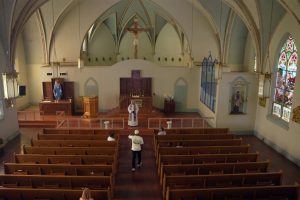Amidst all the chatter about the new translation of the Roman Missal in the last few months, did you ever wonder what might happen if a priest just prayed the Mass in his own words, rather than following the text to the letter?
Apparently, the answer is that he might lose his job.
Father William Rowe, a priest of the Diocese of Belleville, Illinois, has apparently been pressured into resigning from his position as pastor of St. Mary Parish in Mount Carmel, Illinois over his penchant for ad-libbing. In a video interview with the Belleville News Democrat, Rowe explains that he's been making his own amendments to the prayers of the Mass for years, adding or changing phrases to connect standard prayers with themes in the day's readings, songs, or homily. It is not any kind of protest of the new translation, just the way he's always done things.
And that hasn't sat well with Bishop Edward Braxton, who Rowe says has discussed the priest's ad-libbing with him several times over the past five years. But Rowe held his ground, saying the way he celebrates the Mass is the only way he can authentically pray those prayers, and if the bishop could not allow it, he would submit a letter of resignation. And last week, Braxton sent a letter accepting Rowe's resignation.
Some parishioners aren't happy with the bishop's decision, and have started a petition to keep Rowe as their pastor, saying they don't mind his style of prayer. But this whole issue raises a larger question–should priests be given the leeway to change the words to the Mass at their own discretion?
The Belleville News Democrat also has a poll asking readers to weigh in, and as of this writing, the results are pretty evenly split. With nearly 6,000 votes, 47 percent say they have no problem with it if it helps parishioners better understand the Mass, but 51 percent say the priest doesn't have the authority to make such changes (though to be fair, the results were much more in favor of the priest until a certain Catholic blog started directing its readers to vote in the poll).
Certainly the priest can't change the entire Mass into his own words. But is there harm in changing small parts, adding words, or trying to make meaningful connections as Rowe did? Not in my book, but that opens up the slippery slope argument and the inevitable concern about where to draw the line. Can the priest go back to saying "cup" instead of "chalice" in the Eucharistic prayer? And if so, why not go back to all the previous language?
A more important question is what kind of precedent Rowe's case sets for other priests who like to make their own additions or alterations to the Mass. Perhaps people will be listening more closely for infractions, especially if they want to make a complaint against a priest they don't like. And maybe bishops will see this as a green light to put pressure on their own priests to either stick to the words in the missal or resign.
Father Rowe is surely not the only priest who has taken liberties with the liturgy. I'm afraid he also won't be the last one forced out of his parish for praying from the heart instead of sticking to the text.










